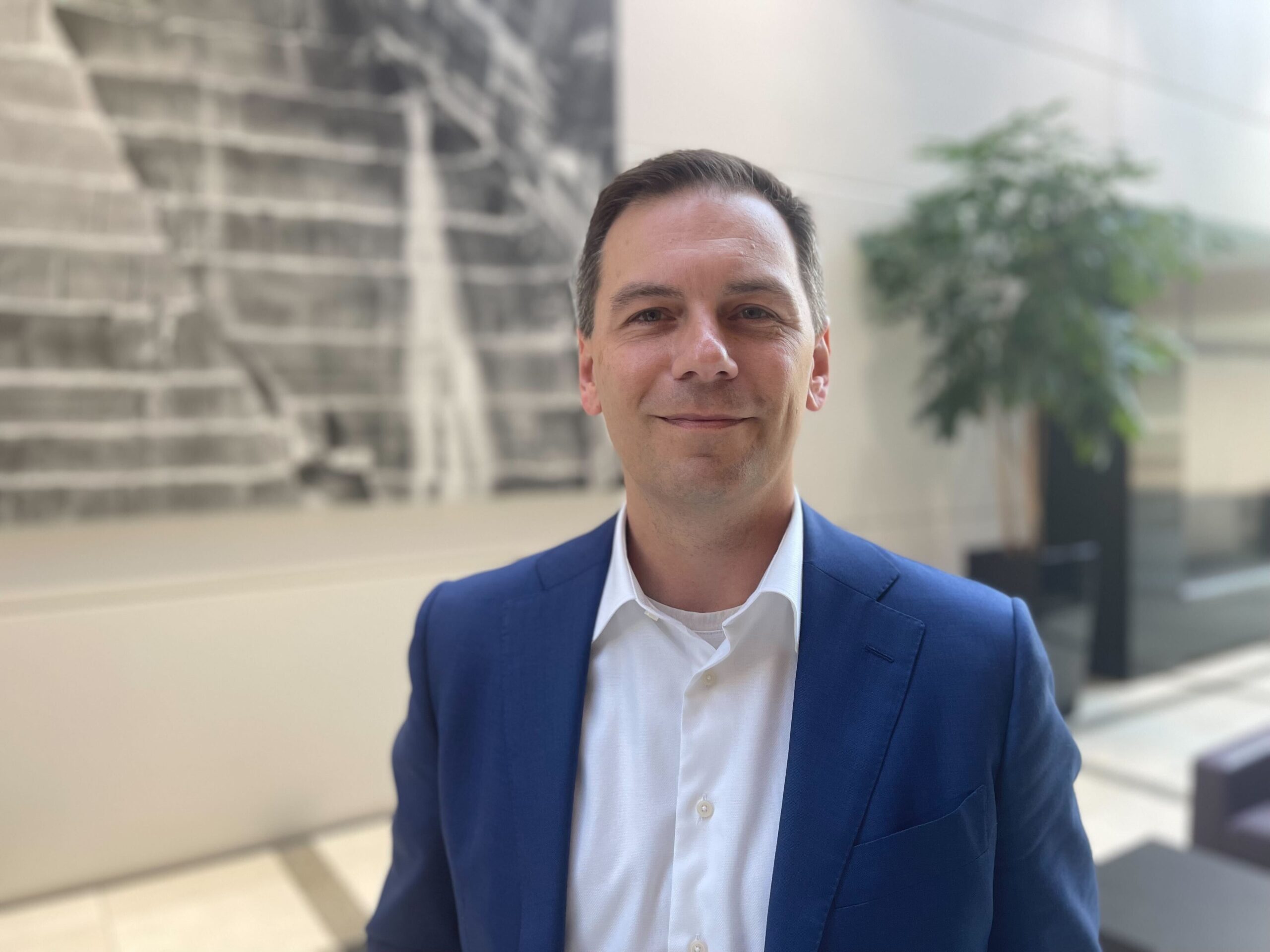
John Kellner wants to use the office of the Attorney General in Colorado to emphasize public safety. The Republican candidate, who currently serves as the district attorney for the 18th Judicial District, said he would make greater use of the statewide grand jury to go after fentanyl drug dealers and organized crime in the state.
In an interview with Colorado Matters host Ryan Warner, Kellner responded to questions about the most recent Supreme Court term, including the reversal of Roe v. Wade in the Dobbs decision. Kellner said he supports the ruling because it returned the issue of abortion to the states. He said he recognizes that abortion access is law in Colorado.
Should he win against incumbent Democrat Phil Weiser, he said, like Weiser, he would crack down on any local government in the state that tried to limit access to the procedure.
Kellner said he believes former President Donald Trump holds responsibility for stoking violence that led to the January 6 Capitol insurrection. Kellner’s interview took place before the FBI raid on Trump’s home in Mar-a-Lago on August 8.
In a written statement after the interview, Kellner called for transparency. He said, “The raid on President Trump’s Florida home yesterday was unprecedented and underscores the need for the FBI and the Department of Justice to be as transparent as possible throughout the investigation. Both agencies should strive to avoid the politicization of law enforcement and I strongly encourage them to release the affidavit in support of the search warrant.”
This interview has been edited for clarity and length.
Ryan Warner: What's the biggest change Coloradans would see if they vote out the current attorney general and vote you in?
John Kellner: The purpose of my campaign is a statewide emphasis on public safety. Right now, it's no secret that Colorado has a pretty dramatic crime wave that we're dealing with. Whether it's stolen car rates, the fentanyl epidemic or our violent crime spiking to a 25-year high, I think Coloradans are ready for somebody who is going to wake up every single day and think about how they are going to make the state safer. I've been a crime fighter prosecutor pretty much my entire career, whether it was in the Marine Corps or now as the elected district attorney for the largest, most populated judicial district in the state of Colorado. That's really been my focus day in and day out: What policies can I advocate for that make Colorado safer?
Warner: It's much easier to affect that change as a district attorney. That district attorney role is so much closer to the crime, for lack of a better way of phrasing it. Give me an example of a power you see in the attorney general's office that is driving you to run.
Kellner: The attorney general has that bully pulpit and has the biggest megaphone out there to advocate for smart, common sense, public safety policies at the statewide level and at the legislature. Specifically, the Colorado attorney general has access to the statewide grand jury.
What I do in the 18th [Judicial District]: We go after fentanyl cartels, oftentimes originating in Mexico, who are peddling this poison in our communities. Last December, we indicted over 20 individuals. We seized some 24 firearms, 110,000 fentanyl pills, and [we were] trying to dismantle an organization that was pushing poison on young people and causing untold death. That's the local grand jury that I'm using; The statewide grand jury has the ability to look at this holistically across the entire state. I think that's truly what we need because this isn't a local problem. It is very much a statewide issue.
Warner: Would you use the statewide grand jury more than the current attorney general? Do you think that's an underused resource?
Kellner: Absolutely. The statewide grand jury can do things like going after organized retail theft organizations and organized car theft organizations; groups of people that are working together in harming communities on a much broader scale. I'll tell you, that's really important with the fentanyl accountability bill that was passed here in 2022.
Warner: I wanted to ask you about that; You think it's a good law?
Kellner: I think there are some things in there that are going to be very useful and very helpful. I didn't hold back on my criticism in saying that I didn't think it went far enough. With how deadly fentanyl is, it really needs to be a felony to possess any amount of that.
Warner: Yet, so often people don't know they have it, John.
Kellner: I think that is less and less the case now. There is a lot of discretion at the district attorney level to really understand what is motivating people. Let's say somebody did accidentally buy a pill that had fentanyl in it and somehow got arrested for possession of that amount: If they're a low-level, first-time user, the goal of our justice system is to connect those people with treatment and resources. They're looking at diversion so they get into treatment — not even necessarily complete the entirety of the treatment, but get through three or four of the sessions and get on that right path. We'll withdraw those charges and hopefully keep them on that right path.
Warner: CPR News’ health reporter, John Daley, was at Red Rocks recently and wrote a story about test strips for fentanyl, which are becoming increasingly available. There was indeed a party there who didn't know their drugs were laced with fentanyl. What evidence do you have that less of that is happening?
Kellner: That's just my experience in the justice system: Interacting with a lot of folks who get arrested for possession and say they knew what they had was fentanyl. On top of that, I think it's become more and more prevalent, certainly throughout the media and everybody talking about it, that this fentanyl has really gotten its way into most of the drug supply out there.
Warner: You think that message is reaching people more than it used to?
Kellner: I certainly think it is.
Warner: I want to ask you about two recent U.S. Supreme Court rulings — on abortion and guns. Why don't we begin with abortion. In a recent debate, you said you support the Dobbs decision overturning Roe V. Wade. Legally, why do you believe it was the right ruling?
Kellner: I think it's important that that be returned to the states to make that decision. I believe that as it works through the political process, as it has done here in the state of Colorado, you're going to see states moderate towards an acceptable middle that many Americans support. In the state of Colorado, abortion has been legal since before Roe V. Wade.
Warner: That's right.
Kellner: It's legal after Roe V. Wade. Just to be clear and address that head-on in case this is your next question: yes, as attorney general, I will defend the law of the state of Colorado, the Reproductive Health Equity Act. I truly understand that in Colorado, and look, not only have people spoken through their legislature as the Dobbs decision basically allowed them to do, but they have spoken through that direct democracy path of saying ‘This is what we support in Colorado.’ I respect that.
Warner: I hear you saying that Colorado has settled on the issue of abortion and it wants to maintain access. Yet, we hear other Republicans who say there ought to be a federal ban on abortion and that access shouldn't be up to the states. Would you enforce a federal ban?
Kellner: I think that's a big hypothetical. We have a long way to go before [we are] anywhere close to seeing a federal ban be put in place.
Warner: All laws start as hypotheticals, though, and the discussion is underway. Where do you stand on a federal abortion ban?
Kellner: What I don't think is realistic is a federal abortion ban. I don't think there's the votes for that. I don't hear people realistically discussing a federal abortion ban. Certainly, when it conflicts with what the Dobbs decision said, in terms of returning it to the states to make that decision, and our state of Colorado having spoken on that issue, I think the attorney general would have a significant role in standing up to support our state's decision, and I would do that.
Warner: State lawmakers this year cemented abortion access into Colorado law. You made a reference to that law. It forbids local governments from restricting the procedure. I'll just say that your opponent in this race says that he would sue any locality that tried to restrict within Colorado. Would you deal with that any differently?
Kellner: No, I think that's the right answer. When you're talking about upholding the rule of law and upholding the law of the state of Colorado as the attorney general is sworn to do, that is what I will do as AG.
Warner: The result of the Dobbs decision is that there are now different laws in different states. What that means is we know people are coming to Colorado seeking abortions because they are from places where they are banned. Would you cooperate with authorities in those states if they try to go after those patients or their healthcare providers?
Kellner: No. I don't think it's realistic or lawful for another state to criminalize the conduct that somebody engages in that's lawful in another state. I also have heard people be concerned about restricting their right to travel between states. I think that's flatly unconstitutional, and I would stand up against that, too. To take it another step further, I mean, you're talking about medical doctors who are licensed in the state of Colorado performing a lawful procedure in the state of Colorado, to see someone outside of our state try to criminalize that is wrong, and I would fight that, too.
Warner: In a concurring opinion to Dobbs, Justice Clarence Thomas wrote that the Obergefell ruling that made gay marriage legal nationwide, and which is the only protection for same-sex unions in Colorado, should now be reconsidered. Do you agree with him?
Kellner: No. I think Thomas is in the vast minority here. I think in the state of Colorado, and especially nationwide, we have moved over the years towards respecting marriage equality. I think it has become entrenched in our culture and society. As attorney general, if anybody tried to restrict somebody's right to marry a person that they love, I would fight against that.
Warner: Why do you think a good number of people in your own party disagree with that?
Kellner: You'd have to ask other people why they think that way.
Warner: You have conversations, though, with other Republicans.
Kellner: Of course, but we're not all cookie-cutter people. We have differences of opinions. My life experiences have informed my beliefs on this. Part of that is having been in foreign countries, like Afghanistan in the Marine Corps, and seeing how people are mistreated in cultures and societies that don't respect people's differences, and finding that abhorrent.
Warner: Let's talk about guns. After the Supreme Court struck down New York's concealed carry restrictions, do you believe there are gun laws in Colorado that are now unconstitutional?
Kellner: I wouldn't go there. I think what the Bruen decision really said was, [if] you're going to overly restrict a law-abiding person's right to defend themselves, then there is probably a second amendment constitutional challenge that's coming your way. They didn't go out of their way and say, we're striking down a state's decision to require some kind of training before you can get that license or a state's decision that says, if you are a prior convicted felon, you cannot possess that firearm. It really was narrowly tailored, and I don't see that as being the avenue by which people are going to effectively be able to attack Colorado's laws.
Warner: One role that the attorney general plays is to monitor and report on the red flag gun law in Colorado to see how often it's used. The idea being that if someone is a threat to themselves or others, a judge may rule with intervention from a family member or law enforcement, that that person's firearm be temporarily removed. Do you support the red flag law?
Kellner: It is, and it's something that's come through our office on occasion and it has potentially saved lives. I was asked about this in the forum in Aurora not long ago: I had just attended our 10-year anniversary of the horrific mass shooting in the Aurora Theater where 12 lives were lost and 70 others horribly injured. Of course, our office had that front row seat and that responsibility to seek justice in that case.
Warner: You were not district attorney then, to be clear.
Kellner: I was part of the office. It was an all-hands-on-deck case over many years. It's one of those situations where you sit there and say, look, if there had been a way, if we had known that this man was going to engage in this sort of horrific mass murder, and there was a legal way to have potentially prevented that, yeah, I would have used that.
Warner: I'd like to get you on the record as a law man about the January 6th insurrection and the false claims of election fraud that fueled it. Do you dispute the results of the 2020 election and was the attack on the capital wrong?
Kellner: No, I don't. That's something I've been very consistent on since I announced my campaign, and frankly, [I have been] consistent in my thoughts going back to when I was originally elected [as district attorney] in 2020. I had a very close race, and so it was closely monitored when I ran for district attorney.
Warner: I remember it took a day or two, didn't it?
Kellner: It did. It took a few days. It was one of those things where you see very closely and personally how accurate and effective our Colorado system is, especially among my four counties, and the different clerks that worked really hard to make sure it was accurate.
No, I don't believe the election was stolen. I've said that since Day One of my announcement that I was running for attorney general.
In terms of January 6th, I think anybody who broke the law, anybody who assaulted a police officer, people that committed vandalism and tried to prevent the peaceful transfer of power should suffer the consequences in court and probably look at jail or prison time.
Warner: Should that include Former President Trump?
Kellner: I think President Trump stoked a lot of that when he was talking about things like a stolen election. People were talking about unleashing the kraken and things that have never materialized with any sort of evidence. Yeah, I think there is some responsibility there for somebody that's pushing out that narrative.
What we've seen thus far doesn't lead me to say there is a criminal case to be made. I don't know about the civil aspect of that and what a plaintiff's attorney might come up with, but I don't see that one moving forward either.
Warner: You've pointed out that you were just elected district attorney in 2020. That means you’re two years into that role, and now you're seeking the attorney general's seat. Why now? Why not give more time to that judicial district?
Kellner: It is a great question because my life goal is to be the district attorney; I love being a prosecutor. Ever since leaving active duty in the Marine Corps in 2011, that's what I've made my career in Colorado: Seeking justice for victims in court. I also got a very clear view of how statewide laws and policies have failed to keep people safe, and I realized that if I want to turn the tide on this crime wave that's affecting my jurisdiction, it starts higher than just the district attorney. It is about replacing people who have enabled criminal coddling behavior and laws, and they frankly need to go. We need stronger leadership at that state level if we really want to affect the future of Colorado when it comes to crime.
Warner: We have talked about fentanyl, which is an opioid. In recent years, Colorado's attorney general, like many state’s attorneys general, have been closely involved in settlements with opioid manufacturers. Colorado is set to receive around half a billion dollars, and more is likely as the Sackler family emerges from bankruptcy. Do you see today's fentanyl crisis as tied to the original over-prescription of painkillers?
Kellner: As somebody who has been in the prosecution world for a long time, I do see a pretty clear line between the over-prescription of painkillers and opioids leading to heroin abuse and to fentanyl abuse, which is now causing the 900-plus people to overdose just last year alone. Yeah, I do see a clear connection from that corporate boardroom and the decisions that are made to try and push opioids on people that probably didn't need them, and probably needed far less if they did, to where we are today.
Warner: Yet, the blame you cast was on the current administration and the current sitting attorney general. I mean, doesn't the blame fall squarely on those manufacturers?
Kellner: Oh, I don't know what you mean by blame. I've criticized the settlement amounts. We're talking about 9,000-plus deaths related to opioids over the years that I think we should be seeing more than the $400 million coming to our state. As somebody who sits on a regional council for opioids as well, you start to see — this is not a lot of money spread out over 18 years, especially when you're accounting for the level of death and addiction that our state has seen.
Warner: One of the primary roles of state attorney general is consumer protection under what is generally called the Department of Law. What do you think is a big threat right now to consumers? What do you see on that horizon?
Kellner: There are so many threats to consumers right now. I mean, obviously robocalls are a scourge that we all hate and we probably get about a dozen of them nearly a day. Here's the thing: more and more scammers are focusing on elderly folks. I host this annual senior Law and Safety Summit where we're trying to spread the word to folks that are potentially more vulnerable to these scam calls. There are a lot of people that are engaging in these scams that are much more sophisticated, and that's a big concern for everybody.
I do see one of the big failings from the current attorney general is that some hundred-million dollars of unemployment insurance and trust fund money that was paid out for fraudulent claims throughout the course of the pandemic. I think thus far, we've seen about 0.3 percent of that actually make it back here.
The problem with that is the amount of time that has gone by. You are running up against real issues in ever being able to see any of that money come back because it is long gone, offshore and overseas at this point.
Editor’s note: According to the Attorney General’s office, the Colorado Unemployment Fraud Task Force has referred 17 criminal cases to prosecutors, which accounts for $300,000. The task force is still investigating and Weiser’s office says more referrals will be issued in the coming months.
Warner: John, thank you for being with us.
Kellner: Thank you so much, Ryan. I appreciate the time.









